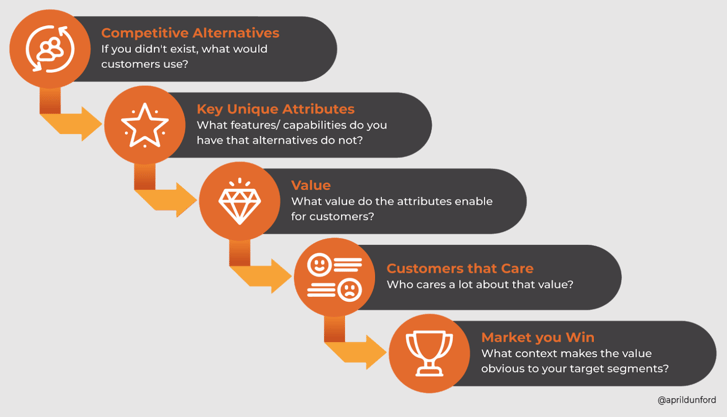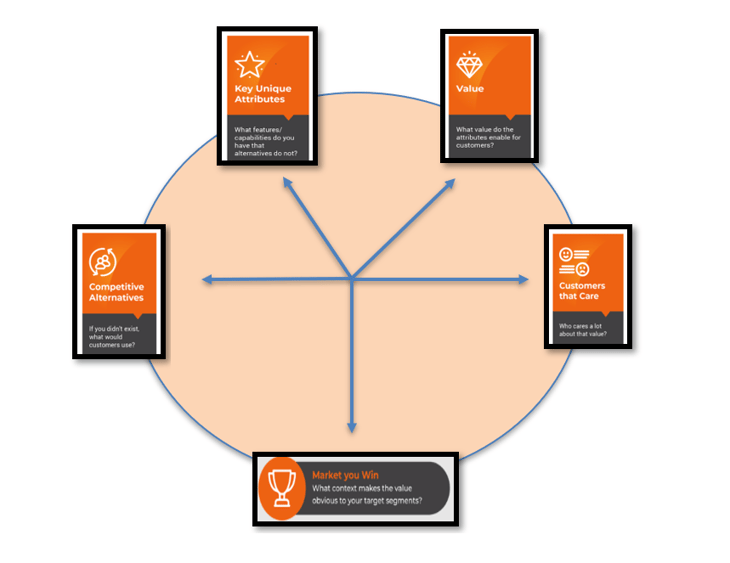
At the end of the day, the primary concern of any TTO is to get their innovations out the door. This now requires a significant investment into marketing to find fruitful partnerships. In this series, we examine some of the techniques that marketing departments can utilize to automate processes and ensure that their outreach will bear fruit.
One of the first things that a marketer might consider when looking to establish those connections is the positioning of the technologies. The term has different meanings to different people, and you would be surprised to learn how often many miss the target. Positioning is not a tagline, a brand statement, or any other sort of messaging. According to April Dunford (positioning guru extraordinaire), positioning is about setting things into context and asking the right questions. So what questions are the right ones? What are we referring to when we talk about context?
We all know what context is and how it helps us to frame things, but it can be substantially undervalued (stick around ‘til the end for a great illustration of this). For someone who knows nothing or next to nothing about what you are offering, they will be grasping for context to answer their most pressing questions such as: Who is the target market? Who do I want to attract? Who will this research benefit? What is the value add of my innovation?
Positioning is providing a frame of reference. Take the opening scene of a movie. Typically, the director paints a picture to absolve us of some of our major lingering questions such as location, time, characters, conflict. This is positioning the movie so that you can have some of your big questions answered without having to spend a lot of time.

What is the value of positioning?
Proper context negates assumptions and ensures that the narrative is NOT stolen from you! You are the artist – you paint the picture. The receiver of the message will no doubt apply their context to your idea and lending clarity will help communicate your vision on your terms. It seems simple, right?
This thoughtful and strategic approach to positioning would seem like common sense but is quite difficult to execute at the onset. While it may seem obvious that this is an important aspect, we often fall into the trap of assuming that others will see the context inherently. Operating from an assumptive mindset can often result in attracting the wrong partners and sending confusing messages. It’s because of assumptions that many do not carefully consider the context when presenting to potential clients. Remember - although you might see your offering from one perspective, the receiver will contextualize it through their own lens and possibly miss the value. (their questions may no longer lead to your answers). If you leave a breadcrumb trail however, they are more likely to follow you down the path you intend.
Ultimately, this can be a significant time-waste for both parties. By being clear to position your innovation correctly, you are making it significantly easier for licensees to make the decision of whether it is the right fit by removing the guesswork of trying to interpret the value themselves.
The five components of positioning
Dunford identifies five components of great positioning as:
- Competitive Alternatives
- Differentiated “Features” or “Capabilities”
- Value for customers
- Target Customer Segmentation
- Market Category
Defining these in the best way possible in the onset will build your framework for the proper context. Consider these questions to jumpstart your positioning approach:

If you struggle to answer these questions in a clear way, how much success will the receiver have in their own interpreted assumptions?
In our experience working with clients to develop and execute their ideas, it is apparent that the relationship between these questions and answers is multi-directional. For example, reflecting on the question of what the innovation is bringing to the table in comparison to prior innovations can help define competitive alternatives, value, and customer base. A better representation of the relationship is:

Clarifying these questions can help solidify your ideas while lending clarity to the receiver – the benefit is two-fold. In some cases, the process can reveal the potential of separate markets or changes to the innovative design that may not have been considered before. Answering these questions clearly will add value and if the value is apparent, then licensing is sure to follow!
The power of positioning is such that some legwork in the onset can absolutely streamline the tech transfer process by giving the licensee all the tools they need to answer their questions without asking. In the next part of this marketing series, we will define the five components of positioning more clearly and provide some techniques for successful TTO marketing.
To take an extended look into this and other techniques that we use here at KISSPlatform to help you find your best partners, sign up for our upcoming webinar on June 1st!
Resources:
We here at KISSPlatform believe that April Dunford has created one of the best books available for marketers, "Obviously Awesome." We refer to these techniques on the daily and you should absolutely check out her website!
(As promised, here is the example: watch a movie trailer for “Shrek Forever” with no voice overs and see what a bit of context can do).
Shrek Forever After Without Context


